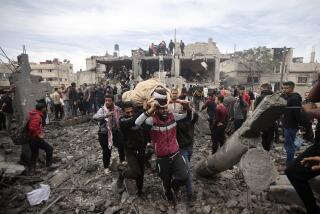How Best to Help Contras
- Share via
A case can be made for a temporary continuation of U.S. non-lethal humanitarian assistance to the Contra rebels who have been waging war against the government of Nicaragua. But any such assistance must support and reinforce, not undermine, the Aug. 7 Central American peace plan.
The first order of business is to get a cease-fire in place. The postponement of those negotiations by the Contras last week was most unfortunate. The resumption of the talks has now been scheduled to coincide with the return Thursday from Europe of Cardinal Miguel Obando y Bravo. He is the official mediator and chairman of the Nicaragua National Reconciliation Commission, created by Sandinista President Daniel Ortega in conformity with the peace accord.
Once the cease-fire is in place, there will almost certainly be a need for food for the Contras during the transition period. This has been acknowledged by the Sandinistas. Such assistance should be handled by an international agency or by a church group under the authority of Obando y Bravo. The supply line operated by the Central Intelligence Agency through Honduras should be terminated, for it is in direct violation of the peace agreement itself.
President Reagan has, through his press spokesman, made it “absolutely clear” that he will not involve the White House in moves by the Contras to solicit private funds. As the White House acknowledged, revelations of the secret supply network created within the White House in the Contra-scandal period amply demonstrate the folly of that sort of covert assistance. The Contras hope to obtain private donations for humanitarian assistance through two foundations that they have established in Washington, and they will solicit funds for arms from foreign sources at the same time. That manifests their intent to pursue the war, despite the wise and welcome decision of the House of Representatives to cut off U.S. government assistance. That is to be regretted, but it hardly is a surprise. From the beginning, most of the Contra leaders have seemed committed to trying to shoot their way into power in Managua.
Working with the Contras will be no easier after the resignation Feb. 6 of Alfonso Robelo from the Contra directorate. Like Arturo Cruz, who resigned in March, he was regarded as a key figure in providing a moderate and democratic commitment in contrast with some of the other Contra leaders who are closely identified with the Somoza regime’s National Guard and a military solution.
Cruz is a strong supporter of the August peace plan negotiated by President Oscar Arias Sanchez of Costa Rica. In an article last summer, he wrote that the plan “represents a visible, and the only available, vehicle in which to escape from our present tragedy.” He reaffirmed his hopes for the plan in a phone conversation Wednesday.
Robelo left the Contra political-military command with a message of equal importance. “The political side is more important now,” he said. That is apparently not yet understood by other Contra leaders. Nevertheless, the White House and Congress can demonstrate their understanding by the way they provide non-lethal assistance for the Contras, in full respect of the peace agreement.
More to Read
Sign up for Essential California
The most important California stories and recommendations in your inbox every morning.
You may occasionally receive promotional content from the Los Angeles Times.













